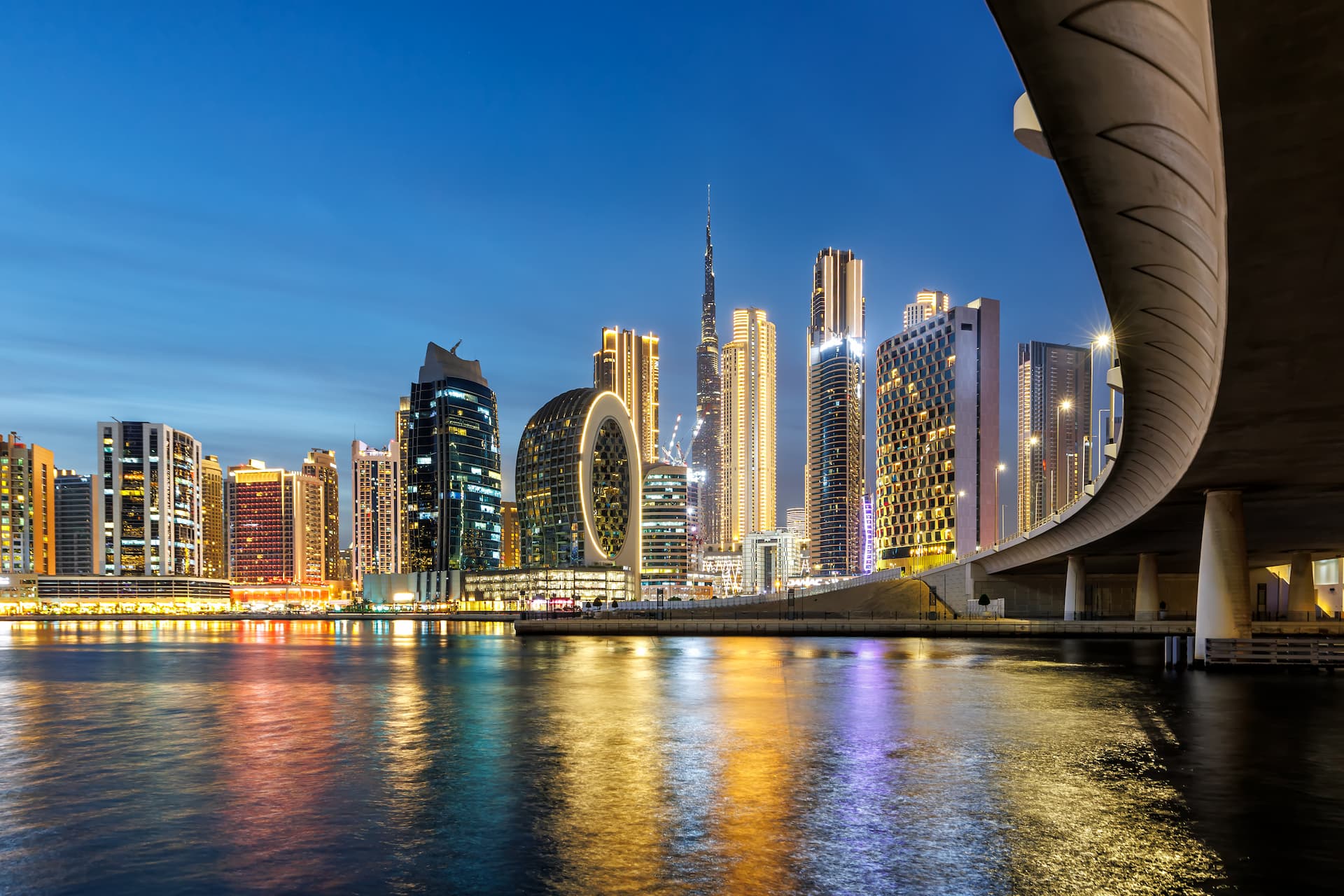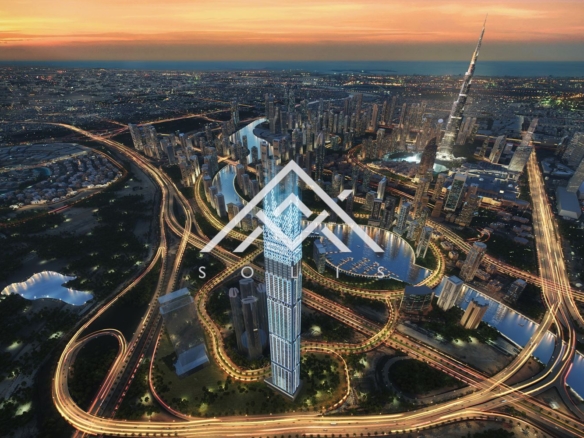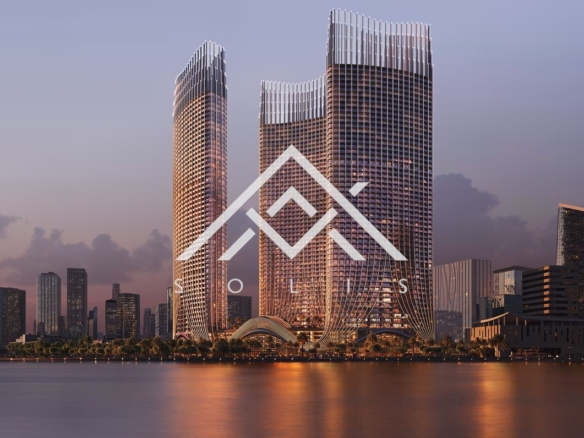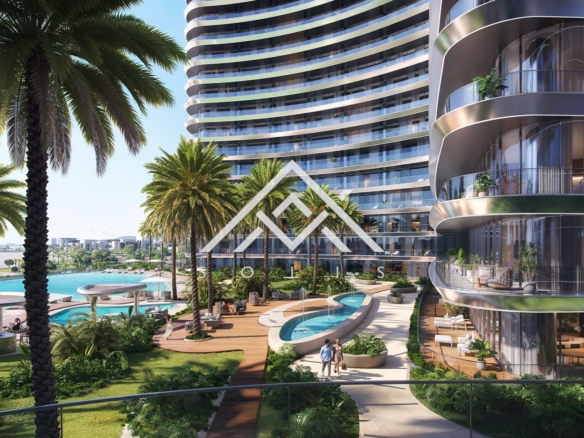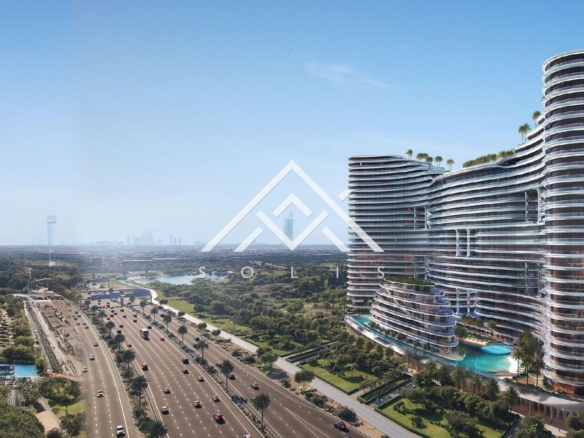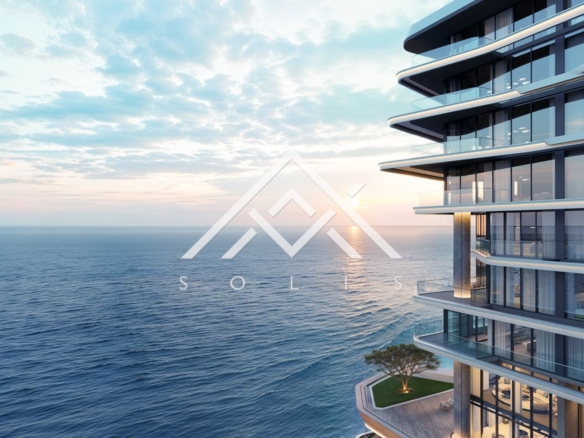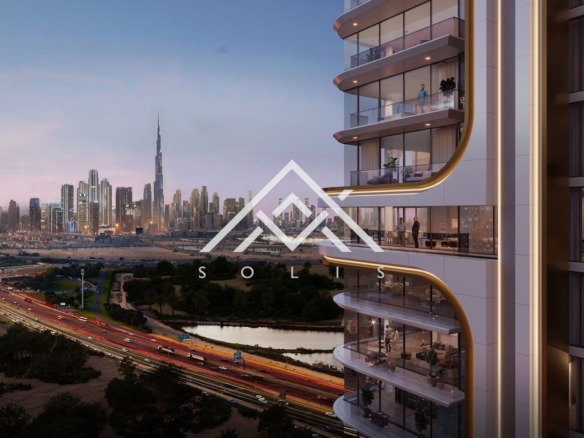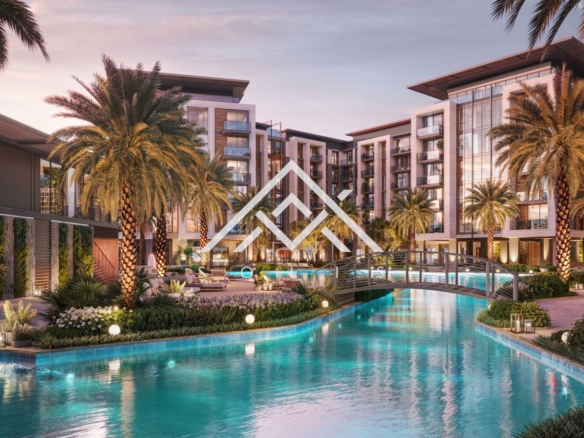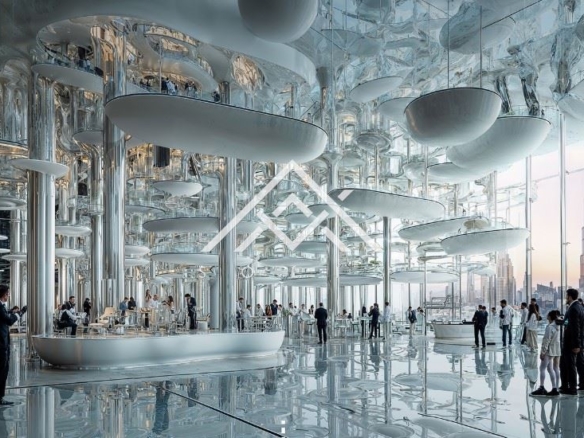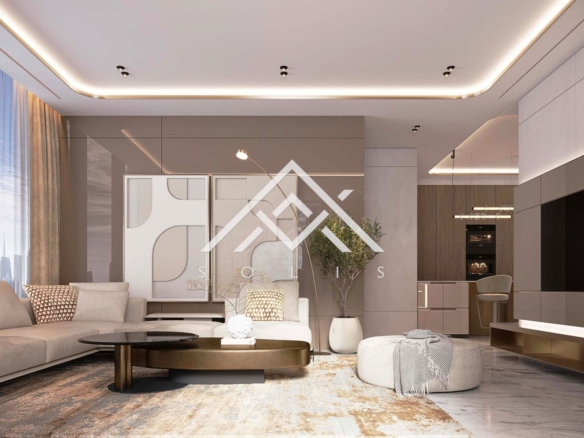Dubai has established itself as a global magnet for real estate investment, combining a futuristic vision with a tradition of a free market.
Over the past two decades, Dubai has built itself as one of the rarest examples in the world of a city that not only accepts capital - it protects it, develops it, and gives it room to grow. This is not the result of chance, but of a well-considered development strategy. In a world where crime and bureaucracy often undermine trust, Dubai has become a haven not only for capital, but also for peace of mind.
A strategy that builds the future
The Dubai Economic Agenda D33 is an ambitious plan to double the economy by 2033 and transform the city into one of the top three global stages for business and investment. Over a hundred projects don't just create jobs or build facades; they build a sustainable environment that protects value, fosters technological entrepreneurship, and transforms Dubai into an ecosystem where capital grows openly and boldly. This strategic vision aims to investments in Dubai to be supported by infrastructure, innovation, and environmental stability, so that every dirham invested finds fertile ground for development.
City plan as a vision
The Dubai 2040 Urban Master Plan doesn't treat property as a sum of square meters, but as an organic part of the city's living structure. The plan weaves together green spaces, high mobility standards, cultural and educational hubs into a harmony of convenience and long-term vision. Thus, the home ceases to be just a shelter, and becomes a strategic presence in the network of the future. Investing in real estate here means becoming part of a holistic urban organism, in which real estate in Dubai are connected to parks, business centers, and modern amenities.
Tax environment and corporate freedom
Dubai's tax policy is designed as an embrace of global capital. Zero income tax for individuals and on real estate, no capital gains tax, and as of 2023 - corporate tax of only 9% on profits over 375,000 AED (~93,000 euros). Below this threshold - complete tax freedom. In most freezones The minimum capital for establishing a company is symbolic or completely free, allowing for a lightning-fast business start-up. Additionally, Dubai offers the opportunity to structure investments through the Dubai International Financial Centre (DIFC) – an area with an independent legal system based on English common law, which provides a high degree of predictability and protection for global investors. The lack of control over currency transactions allows for the free withdrawal of capital and profits without administrative barriers. It is no coincidence that Dubai is often compared to an oasis for entrepreneurs – here Dubai taxes are minimized, and the regulations work for, not against, the business initiative.
Legal regime of property for foreigners
Unlike many Asian countries where foreigners can only lease land long-term (leasehold), Dubai offers the possibility of full ownership (freehold) of land and property in certain areas. The law clearly states that Foreign investors can buy, own, and sell property in Dubai, but only in explicitly designated freehold areas artharealty.comThis option is enshrined in Dubai Law No. 7 of 2006 - the Real Estate Registration Law, which gives foreigners full ownership rights in approved areas. Examples of such freehold zones are PalmJumeirah, DowntownDubai, Dubai Marina, Jumeirah Lakes Towers, BusinessBay, DubaiHills Estate and many other key locations artharealty.comOutside of these areas, foreigners cannot acquire real estate in fee simple, which highlights the importance of the correct location when investing.
In these freehold zones, the foreign investor can own the land indefinitely - to sell it, transfer it, or bequeath it freely, without the need for a local partner or hidden restrictions. The property is real and protectedThe acquired property is officially registered in the name of the foreign buyer in the Real Estate Register of the Dubai Land Department (DLD), just as it would be registered for a local resident. Furthermore, freehold ownership grants the right to freely bequeath and transfer the property to heirs, regardless of whether they are local or foreign citizens. For complete security, many experts advise expat owners to also prepare a local will (e.g., through the DIFC Wills Service) to ensure that in the event of unwanted events, the property will be inherited according to their wishes and without complications.
Important: In Dubai's real estate transactions there are no notariesInstead of notarization, the transfer of ownership is done directly through the Dubai Land Department - the state body that performs the role of a notary in the emirate. dubai-immo.comThis means that after a buyer and seller (investor) reach an agreement, the transaction is officially registered with the DLD through authorized registration centers, and The notarial deed is replaced by the issued TitleDeed (certificate of ownership from the state). This saves time and costs, and the buyer directly receives a state guarantee for their rights to the property.
Security as part of the financial ecosystem
There is no other city where the absence of crime is so palpable and inextricably woven into the economic architecture. In Dubai You can leave a bag of money on the street and find it an hour later untouchedThis culture of order is not a myth, but the result of a strict legal framework and a social contract, in which breaking the rules is an exception. Dubai is consistently ranked among the safest cities in the world with minimal crime rates. uniqueproperties.aeThis sense of security is not just a social bonus, but a fundamental part of the city's investment climate. When capital seeks refuge, it finds it in a place where contracts are honored, the law is above all, and personal and property security are guaranteed. Investors value not only the opportunity for profit, but also the peace of mind that their assets are in a place protected by the rule of law and effective institutions.
Escrow Protection and transparency when buying property
One of the strongest protections for real estate investors in Dubai is the mechanism escrow account (escrow account), regulated by the Dubai Land Department. The Escrow Account Law (Law No. 8 of 2007) requires every developer who sells off-plan properties to open a special escrow account for the project windmillsgroup.comBefore construction begins, the developer is obliged to deposit a minimum of 20–30% of the project value into a protected escrow account windmillsgroup.comThis initial investment by the builder serves as a guarantee that the project is financially secured from the very beginning.
On the part of the buyers, upon signing a preliminary agreement (Sales and Purchase Agreement, SPA), a 5–15% reservation deposit is usually paid. artharealty.comThen, the buyer makes subsequent payments – often up to 30-50% of the property value – distributed in several tranches according to the progress of construction and the conditions of the specific project. All these payments do not go directly to the builder, and are deposited into a controlled escrow account associated with the project chestertonsmena.com artharealty.comThis account is managed by a DLD-approved bank or trustee, and the funds can only be withdrawn by the builder upon proven completion of specific construction stages and with the regulator's approval. Thus, investors' money is protected – it is used solely for the purposes of the specific project and cannot disappear or be misappropriated.
An additional security level is required the preliminary contract and payments to be registered in DLDEvery off-plan property sale must be entered in the so-called Interim Real Estate Register (system Oqood) within 60 days of the transaction chambers.comRegistration (performed by the builder) formally registers the buyer as the future owner of the specific property. If this registration is not done, the sale may be considered invalid. chambers.comTherefore, the investor must ensure that their contract is duly registered - usually for a one-time fee of 4% to DubaiLand Department (DLD) (on the property value) plus a small administrative fee. This 4% fee to the Dubai Land Department is equivalent to notary fees in other countries and officially registers the transfer of ownership dubai-immo.comUpon its payment, the buyer receives a registration certificate (Oqood certificate), which guarantees their rights to the property under construction.
Transparency In Dubai, it's not a promise, but a practice – every stage is documented, every fee is clear and regulated. The law prohibits builders from imposing additional hidden fees when selling or reselling off-plan properties, unless officially approved by the DLD chambers.comBuyers pay a 4% registration fee to DLD and usually around a 0.5% certificate issuance fee (Oqood or subsequently a final Title Deed). There is no agency commission when buying directly from an investor (in most cases, the broker's commission is covered by the builder as part of the marketing expenses). All these measures make the market extremely attractive to global capital – Trust here is built on real guarantees and regulationsthat protect both sides.
It's not surprising that with every pre-launch Event of new projects, the properties are bought up literally in hours - because trust here has an institutional basis, and the unresolved risks are minimized.
Process of buying real estate from an investor (step by step)
Buying property directly from a builder (investor) in Dubai - especially at the stage off-plan – follows specific steps and requires a set of documents. Here's a summary of the process that turns a potential investor into a legal property owner in Dubai:
- Property selection and investor research: The first step is to choose a project and a specific property that meets your goals - be it high property yield in Dubai upon renting out, strategic location, or prospect for value growth. It is important to check the builder's reputation. Make sure he is registered with RERA (Real Estate Regulatory Agency) and has a successful history of projects completed on time chestertonsmena.comYou can research its previous developments, its financial stability, and whether the project has all the necessary permits. The Dubai market is strictly regulated, but careful due diligence is an investor's best friend.
- Property reservation: After you choose a property (for example, an apartment with a certain square footage, floor, view), you should reserve it. Usually, you fill out ReservationForm and a reservation deposit is paid, which is between 5% and 15% of the property price artharealty.comThis deposit takes the property off the market for a certain short period and fixes the conditions (mainly the price). Carefully review all the details - layout drawing, square footage, view, number of floors, as well as what amenities and common areas will be available. Also clarify the payment schedule (payment plan) before making the deposit to make sure it meets your financial capabilities.
- Signing of a contract (Sales and Purchase Agreement, SPA): Following the reservation is the signing of the official sales contract. SalesandPurchaseAgreement is the legal document between you (the buyer) and the builder, which describes in detail the property, the price, the payment terms, the deadlines for the completion of the project and the handover of the property, as well as the rights and responsibilities of both parties chestertonsmena.com. Review the contract carefully – it must be approved by the competent authorities (many builders use standard templates agreed with DLD). Pay attention to a clause for penalties or compensation if the builder delays completion beyond the agreed deadline – often the SPA provides for a fine for the builder in case of a serious delay, which further encourages timely execution chestertonsmena.comIf necessary, consult a lawyer or an experienced broker to ensure that all terms are transparent and fair.
- Sale registration (Oqood) and fees: After signing the SPA, the deal must be registered with the Dubai Land Department. For properties under construction, this is done by issuing a Oqood certificate - preliminary registration of the buyer's ownership right to the specific property. Important: Oqood registration requires payment of a 4% fee to DLD (on the purchase price) and about AED 5,000 (around 1,250 euros) administrative fee for issuing the Oqood certificate itself artharealty.comIn some cases, the developer may cover these costs or part of them, but as a rule, the buyer should be prepared to pay a fee shortly after signing the SPA. Registration in Interim Real Estate Register (Oqood) legally certifies your right to the property before its completion artharealty.comUpon registration, you will receive a registration number and/or an Oqood certificate, which means that the state recognizes your future ownership. At this stage no notary needed – the whole process is managed by DLD and authorized trustee real estate transaction centers. You, as the buyer, together with a representative of the builder (seller), sign the necessary forms and DLD officially registers the transaction dubai-immo.com.
- Payments according to the construction plan: With the signed SPA and registered Oqood, the construction period begins, during which you will make installment payments according to the agreement paymentplan. Usually the payment schemes for off-plan in Dubai are flexible - for example 30/70 (30% upon completion, 70% upon handover), 50/50, or even extended plans with a portion of the amount after the transfer of ownership (post-handover) chestertonsmena.comYour responsibility is to deposit the agreed amounts on time into the designated escrow account for the project. Each transfer must be to this secure account, but not directly to the builder's personal account - this ensures that your money remains protected until its actual use for construction chestertonsmena.com artharealty.comFollow the schedule: in case of payment delay, the builder has the legal right (Dubai Law 13 of 2008) to take action, including a warning through DLD and possible contract cancellation if the delay exceeds 30 days. chambers.comAlways communicate promptly if you encounter difficulty – sometimes a short extension can be agreed upon.
- Control of construction progress: While you are making payments, the builder must fulfill their part – to build according to the schedule. In Dubai, RERA (the regulator) strictly monitors the progress of projects. As a buyer, you have access to status information: many builders send regular emails with updates or provide access to a platform with photos from the site. chestertonsmena.comYou can also personally visit the construction site by appointment to make sure everything is going according to plan. DLD also offers online inquiries (e.g. through the Dubai REST app) for the degree of completion of the project. This transparent control gives you peace of mind that the project is progressing and the risk of delay is small.
- Completion of construction and inspection (snagging): When the builder approached the finish and the resulting certificate of completion (Completion Certificate) from the authorities, you will be invited to view the completed property. The so-called. snagging An inspection is a chance for the buyer to personally check the property before the final handover. Pay attention to the details: quality of the finishing work, functionality of the appliances (if furnished), compliance with the agreement - number of rooms, view, floor, square footage. If you find minor defects or discrepancies (e.g., scratches, unfinished details, non-working light switches, etc.), describe them in a protocol. The builder is obliged to remove these remarks at their own expense before the official handover of the property. chestertonsmena.comThe snagging procedure is standard practice in Dubai and protects the buyer to receive the property in the agreed-upon condition.
- Final payment and transfer of ownership: Upon completion of construction and acceptance of the property, the moment of final settlement arrives. If by paymentplan you have left a final installment for the end (e.g. 50% upon handover), now it must be paid - again usually to the escrow account, from which the builder will receive the funds after the transfer. The builder issues NoObjectionCertificate (NOC) – a document certifying that the buyer has fulfilled all their financial obligations to it and that there are no obstacles to the property being transferred. With this NOC, along with the original contract (SPA), your identity documents (passport, visa/Emirates ID if you have one) and a copy of the Oqood certificate, you and a representative of the builder appear before an authorized property registrar (Registration Trustee office) or at the Dubai Land Department itself. Final forms for the transfer of ownership to you are filled out there. A small fee is paid again for the issuance of the final TitleDeed (around AED 580, if the 4% fee has already been paid at Oqood)artharealty.comThe whole process is fast - usually within an hour - after which you receive your TitleDeed – a property document issued by the Dubai Land Department in your name chestertonsmena.comCongratulations – you are now officially a property owner in Dubai! Your property is registered in the real estate register and protected by the laws of the emirate.
- After the purchase - visas, management, rental or resale: Depending on your goals, once you become an owner, you have several options. If you have invested with the goal of rental yield – the Dubai market is favorable, with a net annual return from rents often between 7% and 10%, and for short-term rentals or high-end properties – even up to 15%. You can hire a property management company, which, for a percentage, will take care of finding tenants, maintenance, and bill payments. If your goal was Golden Visa – with an investment of over 2 million AED (approximately 500,000 euros), you are eligible to apply for a 10-year residency visa in the UAE artharealty.comFor smaller amounts, over ~750,000 AED, you can obtain a 2- or 3-year Property Investor Visa. These visas allow you long-term residency and multiple entries/exits from the country without the need for additional permits. And last but not least – if you have purchased the property at a lower off-plan price, after receiving the Title Deed you can already sell it on the secondary market (possibly with a profit if market prices have increased). There is no capital gains tax or other government fees on this resale – only the usual 4% for the new transaction to DLD (which is paid by the new buyer). The liquidity of the Dubai market is high, especially for properties in desirable areas, so exiting the investment is relatively easy.
Protection in case of non-performance by the builder
One of the main concerns of investors – “What happens if the builder doesn't complete the project?” – is clearly addressed in Dubai law. Thanks to the escrow system and strict control, cases of abandoned projects are rare, but the law still provides protection mechanisms. If a project falls into serious delay or the builder becomes insolvent, RERA has the authority to classify the project as "cancelled". Upon an official decision to cancel the project (after careful review and attempts to find solutions) is activated Special tribunal for unfinished and canceled projects in Dubai, which handles the liquidation and settlement of mutual claims windmillsgroup.com.
For buyers, the law is unambiguous: If the project is canceled or has not started at all, the buyers are entitled to a full refund of all paid amounts chambers.comPayments to investors are made from the funds accumulated in the project's escrow account, under the supervision of DLD. Law No. 13 of 2008 (as amended in 2020) obliges the builder, upon cancellation, to return the payments received from buyers through a procedure controlled by the regulators. windmillsgroupIn practice, the guarantor of the guarantee account (usually a bank) works in conjunction with DLD to ensure that all clients will get their funds back windmillsgroup.comThis process is legally protected - the money in the escrow account is separate from the builder's assets and cannot be touched by creditorsBuyers have an advantage in payments (and not the banks or other claimants against the builder).windmillsgroup.com.
In case of minor delays or a partially completed project, the law also protects the buyer. If the builder falls behind, the buyer can legally seek their rights - from claiming a penalty (if provided for in the contract) to filing a lawsuit to annul the contract. There is a legal framework (Art. 11 of Law 13/2008) that determines what the builder can retain depending on the percentage of completion if the project fails due to the builder's fault or upon termination by mutual agreement. windmillsgroup.comFor example, if it is ready under 60%, the maximum withheld percentage is 25% of the price, and the rest is returned to the buyer within a specified period. windmillsgroup.comBut ideally, such situations will not arise - that is why Dubai requires financial stability and real performance from builders before they even start sales.
In short: Dubai's legal system provides investors not only with opportunities for profit, but also with security for their principal. Your capital is protected by a multi-layered framework - escrow, registers, cancellation rules - which minimizes risk to the lowest possible level globally.
Visas and Long-Term Presence
One of the additional rewards for property investors in Dubai is the possibility of obtaining residency status. Golden Visa – introduced in 2019 – provides 10-year residency with an investment in real estate worth over 2 million AED (approximately 500,000 euros)artharealty.comThis visa is automatically renewed as long as the property ownership is maintained, and allows the holder (and their family) to live, work, and study in the UAE long-term. Besides it, PropertyInvestorVisa is available for smaller investments: at thresholds of ~750,000 AED (around 190,000 euros), a 2 or 3-year visa can be issued with the possibility of renewal. These visas transform the property investment into a ticket to a new financial and personal identity – many investors value the opportunity to be part of the dynamic community of Dubai without seeking separate sponsorship from an employer.
Beyond visas, absence of taxes On property and income, Dubai makes itself even more attractive for long-term presence. There is no annual building tax or property tax – the one-time 4% fee upon purchase is the only taxation from the government. artharealty.comThere is also no tax on rental income at the federal level; for foreign investors, this means that if their country of residence does not have a tax on foreign income, rental income is effectively tax-free. artharealty.comAdditionally, the United Arab Emirates does not participate in the automatic exchange of banking information under global tax agreements to the same extent as some other countries – an advantage that is rarely commented on openly, but is silently appreciated by global capital. All this makes Dubai an attractive place not only for investment, but also for personal establishment – a cosmopolitan hub where the investor can feel at home.
Yield and Liquidity of Properties in Dubai
Dubai offers a unique combination of high yield and liquidity of real estate assets. Rental yields here reach 7–15% annually, significantly above the average for many European capitals. Even conservatively, the average property yield in Dubai It is often around 7–8%, which makes the city a preferred destination for investors seeking a stable cash flow. There are several reasons: a constantly growing population and influx of professionals, a lack of sufficient housing in certain segments, as well as a culture of renting (many expats prefer to rent instead of buying, unless they are planning a long-term stay).
In combination with the regulations - preliminary contracts are officially registered, builders are licensed and under supervision - the risk of unfinished projects or fraud is minimized. The secondary market in Dubai is also extremely active, which means that when you decide to sell your property, the likelihood of finding a buyer quickly is high (especially for properties in desirable areas)sandsofwealth.comAccording to 2024 data, over 25% of the transactions are on the secondary market - a sign of a mature and liquid market sandsofwealth.comThe absence of tax burdens upon sale (no profit tax, no stamp duty) encourages the free resale of assets.
All this happens against a background of minimal administrative pressure and lack of automatic exchange of information with foreign fiscal authorities - an advantage that is rarely commented on, but is valued by global capital. Ultimately, liquidity in Dubai real estate means that your capital is not 'locked' - you can release it relatively easily and quickly if the need arises or a better opportunity presents itself.
Conclusion
While many European cities are gasping under the weight of regulations, tax hoops, and social tension, Dubai is building a reality where capital not only survives – it thrives. The city offers a combination of visionary policy, strict but business-friendly laws, and a culture that rewards the enterprising. For the investor, this means freedomfreedom from excessive bureaucracy, freedom from tax burdens, freedom from insecurity.
So, the final conclusion is not just financial, but philosophical: if capital is an extension of our personal freedom, then Dubai is one of the last places on Earth where this freedom is not only respected, but encouraged. Investment in Dubai It's not just a deal – it's a request to participate in a dynamic, secure, and prosperous world, where the future is being built today.
Useful sources and references:
- Dubai Economic Agenda (D33): Official economic development strategy for Dubai until 2033.
- Dubai 2040 Urban Master Plan: A general urban plan with a horizon until 2040.
- Dubai Land Department (DLD): Official website - regulations, services and property verification.
- Golden Visa Program: Conditions and application for a Golden Visa in the UAE.
artharealty.com (Dubai Law No. 7/2006 allows foreigners full ownership in certain freehold zones)
chambers.com (Every off-plan property sale must be registered in the Interim Real Estate Register within 60 days)
dubai-immo.com (In Dubai, DLD acts as a notary and the "notary fee" is paid to DLD)
uniqueproperties.ae (Dubai is one of the safest cities - extremely low crime rate)
windmillsgroup.com (Law No. 8/2007 mandates the opening of an escrow account for off-plan projects)
artharealty.com (All payments must be made to an approved DLD escrow account)
chambers.com (In case of a cancelled or unstarted project, buyers are entitled to a full refund)
windmillsgroup.com (Upon project cancellation, DLD oversees the recovery of funds from the escrow account, which is protected for buyers)
artharealty.com (When purchasing off-plan: installment payments, registration under Oqood during construction, final ownership document upon completion)
artharealty.com (An investment of over 2 million AED entitles you to a 10-year golden visa; there is no annual property tax, only one-time fees)
Selected suggestions
Burj Binghatti Jacob & Co. Residences - the crown jewel of Dubai
- 2,008,220€/3,927,737 lv.
 Rooms: 5
Rooms: 5 309 m²
309 m²
Property in Skyrise, Dubai - High above the city, where dreams take shape
- 345,668€/676,068 lv.
 Room: 1
Room: 1 39 m²
39 m²
Two-room apartment with a garage in the architectural masterpiece - Binghatti Hills, Dubai, UAE
- 259,511€/507,559 lv.
 Type of construction: Brick
Type of construction: Brick Rooms: 2
Rooms: 2 61 m²
61 m²
Binghatti Aquarise - an icon of luxurious living in Business Bay, Dubai, UAE
- 279,238€/546,142 BGN.
 Type of construction: Brick
Type of construction: Brick Room: 1
Room: 1 40 m²
40 m²
Luxuriously finished two-room property with a parking space in the premium-scale project Costa Mare, Al Marjan Island, Ras Al Khaimah, UAE
- 621,845€/1,216,223 lv.
 Rooms: 2
Rooms: 2 71 m²
71 m²
One-bedroom property with parking in Belgrove Residence, Mohammed Bin Rashid City, Dubai, UAE
- 412,480€/806,741 lv.
 Type of construction: Brick
Type of construction: Brick Rooms: 2
Rooms: 2 70 m²
70 m²
Fully finished three-room property with a parking space in the heart of Dubailand, UAE
- €399,195 / BGN780,758
 Type of construction: Brick
Type of construction: Brick Rooms: 3
Rooms: 3 99 m²
99 m²
Premium one bedroom luxury property with study in the iconic second tallest skyscraper Burj Azizi
- 1,615,000€/3,158,665 lv.
 Type of construction: Brick
Type of construction: Brick Rooms: 3
Rooms: 3 103 m²
103 m²
Luxury two bedroom property in Burj Azizi - Dubai's newest architectural marvel
- 2,651,802€/5,186,474 lv.
 Type of construction: Brick
Type of construction: Brick Rooms: 3
Rooms: 3 132 m²
132 m²

